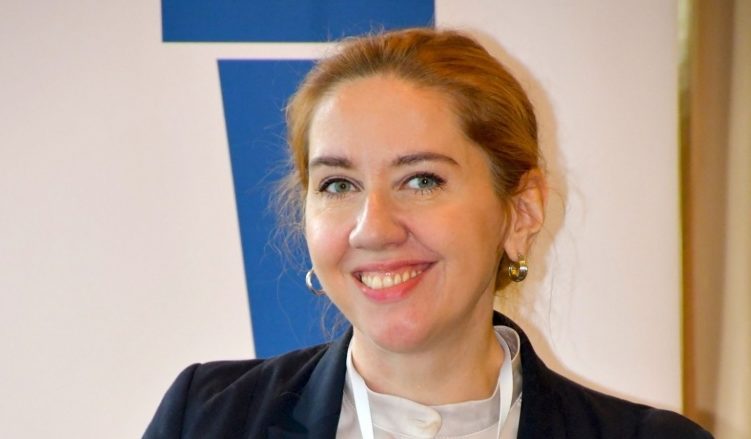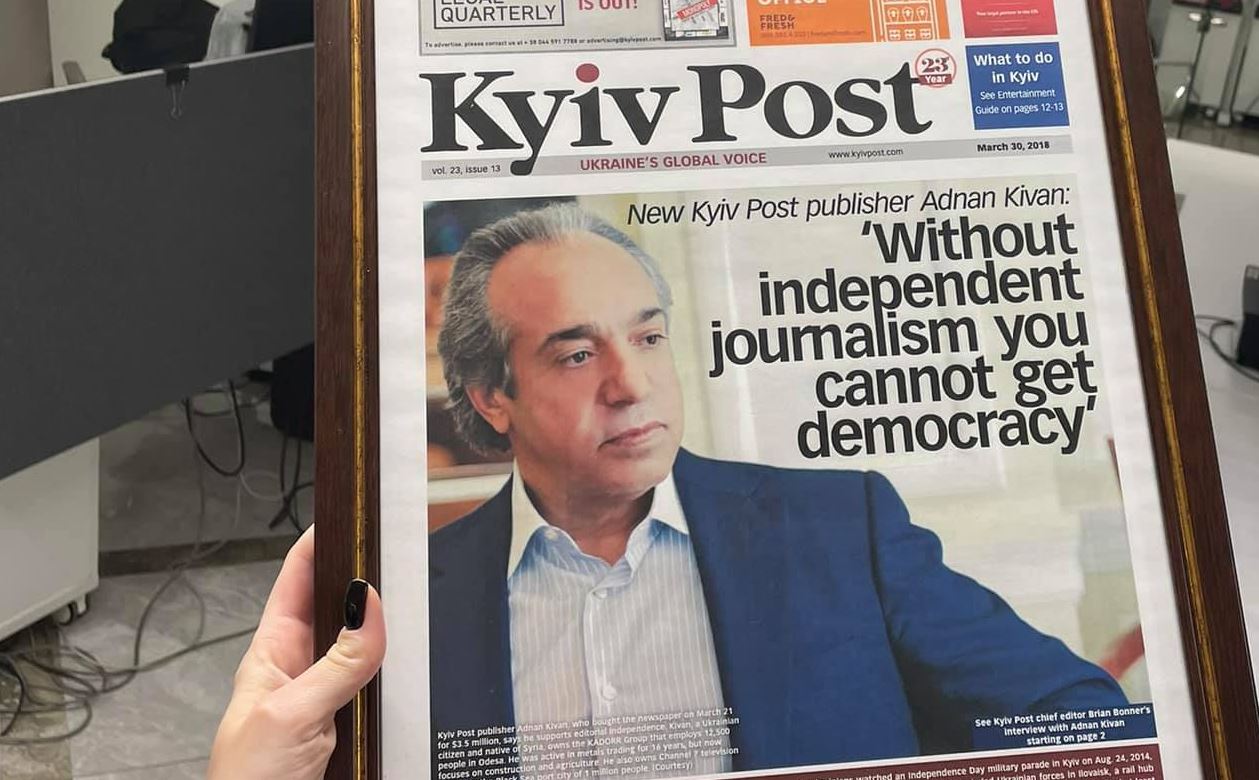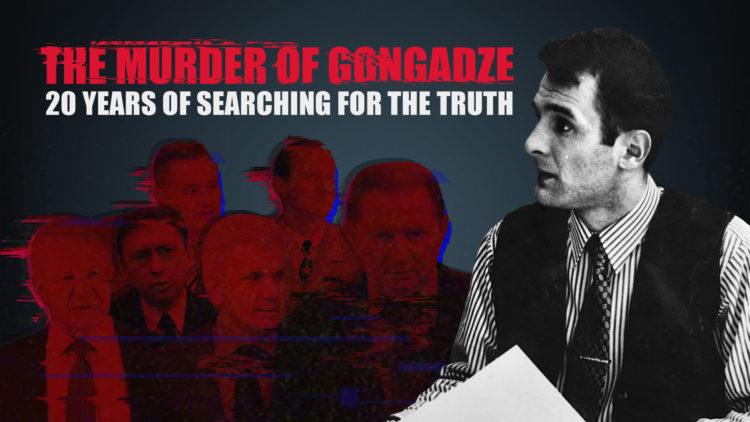In the latest episode of Ukrainians protesting against being put on the same podium with Russian figures, the director of the Kyiv-based Institute for Mass Information has turned down the Johann Philipp Palm International Award for Freedom of Speech and the Press after being nominated together with Russian journalist Aleksei Venediktov.
The award ceremony took place on December 4 in Schorndorf, Germany. Aleksei Venediktov noted that he is the first Russian citizen to receive this award, which is endowed with EUR 20,000.
"And I probably was the first Ukrainian to refuse it," Romaniuk stated.
She explained that she was informed of her nomination together with Venediktov, the former editor-in-chief of the Russian Ekho Mosvky radio station, in the spring.
"Because Ukraine, Russia, symbolism, 'both countries were affected.' But I can't imagine myself physically standing on the same stage and sharing an award with Venediktov. With a Kremlin-authorized liberal, a political scientist who has repeatedly pushed Kremlin propaganda, publicly calling Putin his 'only boss,' boasted of his ties with [Russian Foreign Minister] Lavrov, [Putin's spokesperson] Peskov, and other officials, and so on," she wrote on her Facebook page.
We reached out to Oksana to further find out why she turned down the award. The organizers reached out to her in the spring, informing her of the nomination. At this time, she was up to her ears with procuring bulletproof vests and other items for Ukrainian journalists who were reporting on the Russian invasion of Ukraine from the frontline. She said she is refusing, after which the organizing committee responded in an attempt to explain.
'They responded something along the lines of 'we are nominating you because we stand for peace in the entire world, and want to underscore the role of peace, it's so difficult for us to choose [the recipients].' For me, the situation has three levels.
- The general situation. Now, Ukraine is fighting for its identity. Today and each day, Ukrainians are dying because the Russians attacked us. We are fighting against the Russian Empire, we want to be heard. And western European thought is herding us into the usual familiar magic unicorn story about three 'fraternal countries' -- Belarus, Ukraine, and Russia. They are afraid of changes to this paradigm, afraid of Ukraine becoming a bold country that will build its own path. We are falling out of their convenient worldview of peace as the highest virtue and goal. For me, peace is impossible without Ukraine's victory, without the punishment of all war criminals and propagandists through tribunals. Russia and Russian citizens must repent. They must refuse their imperial past and we will then be able to feel safe and talk about peace. For us Ukrainians, this all is obvious, but for westerners, the self-evident thing is that there should be peace and they don't see the challenges that we face. They don't have such a neighbor at the border, so this is too hard for them to understand.
- Traditional Russophilia, when Russia was imposed on Ukrainians as an older brother that is more developed, progressive, and knows better. Many westerners can't even imagine that Ukraine has fairly developed professional, qualified journalism that is worth respecting and knowing. That Ukraine has many cool journalists who expose corruption in ways Russian ones never imagined. They are at the front, they also fundraise giant sums [to help Ukraine]. And the Germans again crammed us into the imperial picture.
- The figure of Venediktov himself. My reputation is still dear to me, and selling it for EUR 20,000 is simply ridiculous. I remember the interview with Venediktov on Hromadske back in 2015. It was so condescending, he called what was happening here a 'civil war' and promoted other Russian propaganda narratives. Basically, a representative of the Russian imperialists who say they are above the fray, like Dozhd and Meduza. The Russian Empire suits them and Russia's annexation of Crimea suits them. They are satisfied with the current situation: that Russia is the center, around which are satellites that are subordinated to Moscow. They don't want to change this. This is why I don't expect any responsibility from Venediktov and those like him. For me, receiving this award and standing next to Venediktov would be a slap in the face for my colleagues who are fighting at the front, and who gave their lives."
What does Oksana want to tell committees who wish to nominate Ukrainians for awards together with Russians?
"One thing struck me when I was communicating with the fund that nominated us -- the confidence with which they judge other countries and hand out awards. On the one hand I understand that this is important, but on the other hand, if you start doing this, you need to do a lot of work to do this professionally, to profoundly assess the situation, dig out the facts, hear out other sides, use additional sources. This story is not just an award; it becomes political. By taking a neutral position, they actually supported Russia."
Venediktov headed the radio station Ekho Moskvy for 24 years. Part of the holding company "Gazprom-media" (a subsidiary of the Russian gas extraction monopolist Gazprom) that owns 66% of its shares, Ekho Moskvy was shut down by its board of directors on 2 March 2022. This happened the next day after Russia's media regulator Roskomnadzor blocked Ekho Mosvky's website and switched off its radio broadcast over what the Kremlin calls "false information" about the actions of Russia's army during the invasion of Ukraine.
Romaniuk's refusal to accept the award comes amid discussions in Ukraine about the role of Russian journalists and society in general in the rise of Putinism and Russia's ongoing war.
Speaking to Euromaidan Press back in 2016, Russian journalist Aleksandr Shchetinin said that all so-called Russian opposition medias are able to exist only thanks to some stage of cooperation with the Russian regime, while those in true opposition to Russia's war against Ukraine (which, we remind, started in 2014) are imprisoned.
How journalism died in Russia. A Russian journalist describes
Venediktov can be seen as an embodiment of that statement, as his birthdays were attended, in different years, by ex-USSR president Mikhail Gorbachev, imperial ideologist Aleksandr Prokhanov, Putin's spokesman Dmitry Peskov, notoriously Ukrainophobic commentator Mikhail Leontiev, oligarch Oleg Deripaska, and Sberbank CEO German Gref.
Aleksandr Shchetinin also noted that an ingrained sense of imperialism was essential to the coming of Russia as a totalitarian country and criticized the Russian opposition, who he says are no strangers to Russian imperialism:
"During Perestroika and later during the years of freedom and democracy, the question of the destruction of empire and imperial ideology, along with the psychology of the masses, was never raised, because all the democrats believed that Russia should be a great, powerful 'elder' towards those countries that emerged from the Soviet Union and became democratic. Whatever Václav Havel, Mahatma Gandhi, or other Russian equivalents come to power there, within a very short time they will turn into a second Putin, perhaps even more brutal. Here many people hope that if you put pressure on them with sanctions, normal democrats will come to power. I always say, guys, don’t even think about it. If Putin goes away now, in six months, if free democratic elections are held, his even tougher equivalent will win. For Ukraine, it will be much worse. And this is confirmed by the words of Alexei Navalny, who said that Crimea is not a sandwich and you cannot give it back all the time, and by the words of Khodorkovsky, who said the same in a softer way."
The episode with Venediktov comes days after Latvia canceled the license of TV Dozhd (TV Rain), which also positions itself as being in opposition to the Kremlin. The Latvian media regulator NEPLP said that the decision was made after three violations by the Russian TV channel in exile: the absence of an audio track in the state language (Latvian) for broadcasts, depicting Crimea on the map as part of Russian territory, the television presenter’s referring to the Russian army as “our army,” and the possible expression of support for the Russian army.
In a notable illustration of Russian imperialism, the TV channel's management appeared at a meeting with the state regulator to discuss their violations without bothering to find a translator into Latvian. They assumed that the regulator will talk to them in Russian, as it was in the USSR, where Russian was mandated for learning in all republics, while national languages withered.
Latvia cancels license of Russian TV Rain (Dozhd) over “threat to national security”: details
Russian propagandists should be put on “Bucha List” for inciting genocide – Ukrainian MP





